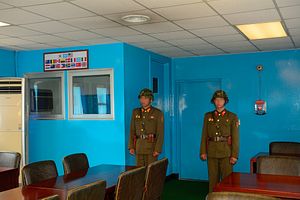Inter-Korean tensions sky-rocketed after August 4, when two soldiers of the Republic of Korea (ROK) were maimed for life after stepping on landmines allegedly placed by North Korea. In response to the North Korean provocation, the ROK decided to resume anti-Pyongyang propaganda, after the broadcasts had been scrapped for many years. Pyongyang warned of possible strikes unless Seoul halted the broadcasts, and actually fired at a propaganda loudspeaker (but did not hit it). South Korean forces fired back, and announced that the propaganda broadcasts would continue.
Subsequently, Pyongyang offered to talk to Seoul in the border village of Panmunjom. On Monday, the talks reached their conclusion: Seoul would cease the propaganda broadcasts in exchange for Pyongyang expressing its regrets for the landmine incident. Assessments of the deal vary, but there are two clear implications. First, the ROK propaganda broadcasts are powerful, and second, that the ROK can leverage this tool in case of further provocations in the future.
The deal demonstrated just how powerful the anti-Pyongyang propaganda broadcasts are. It was very rare for North Korean to address Seoul using the official title of the “Republic of Korea” instead of some variation of the “Puppets of American Imperialists.” Beyond this, Pyongyang expressed its regret for the maimed soldiers. Why did Pyongyang seem to “give in” when face with ROK propaganda?
The anti-Pyongyang propaganda broadcasts, which are part of South Korea’s psychological operations efforts, are perceived as a direct threat to its stability by the North Korean regime. The propaganda broadcasts contain sensitive content that could seriously undermine the morale of North Korean troops on the front lines: K-pop songs, news from around the globe, and most importantly, the news from Seoul. This outside information could have a serious impact on young North Korean troops, who have not been exposed to ROK propaganda as it was halted for many years. For example, K-pop songs inform the young North Korean troops that there are other songs than the Kim family’s propaganda songs; stories of the Free Syrian Army would give troops a chance to question their Dear Leader; and the news from Seoul would let them know how much affluence and freedom South Koreans are enjoying.
As they are exposed to outside information through the ROK propaganda, regardless of how much information they had been exposed to before, the young North Korean troops will compare their country with the outside world, and their loyalty to the North Korean regime may be seriously challenged. What Pyongyang fears more than kinetic retaliations from the ROK is the inflow of outside information. In this context, Kim Jong-un’s regime, which had no previous experience with ROK propaganda, may take any measures necessary to remove the ‘threat’ against the regime.
Since the power of the propaganda broadcasts has been demonstrated, Seoul should use the “propaganda card” wisely when negotiating with Pyongyang in case of a possible provocation in the future. First, Seoul should demonstrate how willing and able it is be to charge Pyongyang a price for its provocation. For instance, Seoul could expand the spectrum of the propaganda from the purely audio domain (speakers and radios) to the audiovisual (using Jumbotrons and TV signals). Otherwise, as long as Pyongyang perceives the gains of provocation as outweighing the costs, it will continue using provocations for political purposes.
Second, Seoul should be bold enough to charge Pyongyang a higher price for provocations than it used to. In the recent deal, Seoul “sold” the cease of the propaganda broadcasts, and Pyongyang “paid” with its regrets and a promise (highly likely to be broken) not to undertake more provocations. In other words, North Korea successfully removed a “pricey” and direct threat to its security by paying the relatively “affordable” price of regrets and promises.
The next time North Korea provokes the South, Seoul should employ more extensive propaganda broadcasts in multiple domains. Then North Korea will again call for an immediate cease of the campaign, which it sees as a direct threat to Pyongyang’s security. Using the same logic, Seoul should consider ceasing the propaganda in exchange for the removal of a direct North Korean threat to the ROK’s security: the North’s long-range artillery. Unlike Pyongyang, which perceived the ROK propaganda as a direct threat to its regime and aggressively called for a halt to the psychological campaign, Seoul did not leverage the issue of the North Korean artillery, which could cause serious economic damages to the South, in its previous negotiations with Pyongyang. As the ROK now realizes the power of its propaganda broadcasts, the ROK government should leverage that power to make North Korea pay the price of provocation, and ultimately break the vicious circle.
For decades, Pyongyang has been using provocations to accomplish political purposes, taking countless lives in the process. It did not pay a heavy price for those acts. However, the landmine provocation and the following inter-Korean deal implies two important points for the ROK: the power of Seoul’s “propaganda card” and how to play this card better.
Finally, North Korea should understand that more provocations will give more opportunities for the ROK to discover more “hidden cards,” meaning provocative acts will work against Pyongyang in the end.
David Eunpyoung Jee is a Korea Foundation Associate Researcher of the Asia-Pacific Security Program at the Center for a New American Security. He previously served as a military officer at the ROK Army Missile Command, and the Operation Center of Republic of Korea Joint Chiefs of Staff.

































